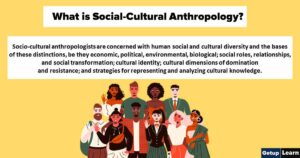Table of Contents
- 1 What is Research?
- 2 What is Scientific Research?
- 3 Scientific Research in Anthropology
- 4 Scientific Research Methods in Anthropology
- 5 Anthropology as a Science
- 6 Approaches to Anthropology
- 7 Types of Anthropological Data
- 8 Methods and Techniques in Anthropology
- 9 FAQ Related to Anthropological Research Methods and Techniques
What is Research?
Research is to see what everybody else has seen, and to think what nobody else has thought. By Albert Szent-Gyorgyi
Scientific research helps to develop new concepts and ultimately leads to discovering new theories and laws or improving the existing ones. A researcher should have the skill and ability to choose appropriate and specific tools and techniques. This is also important to follow a set of procedural rules while conducting research.
These structural procedures and rules are known as methodology. It is the methodology which differentiates scientific research from a non-scientific investigation.
What is Scientific Research?
Scientific Research can be defined as an organised and systematic enquiry into a (physical or social-cultural) phenomenon to discover new or verify the existing knowledge.
Now let’s look at the scientific view on Anthropological Research.
Scientific Research in Anthropology
There are disciplines like Chemistry and Physics which can experiment with different chemical and physical elements. They can dissolve their objects of study, change their form from one state into another, measure them, bend them or twist them.
However, there is a small chance for such drastic transformation in subjects like biology or social science as they deal with living matters. In social science, the subjects of research are human beings. So, making alterations in such subjects is not at all possible for a social scientist.
As we learned before Anthropology is a bio-social science that studies humans in totality. Our concern here is to learn the Anthropological approaches to understanding the social-cultural dimensions of human life.
With this limited purpose, Anthropology could not be said to be an experimental or laboratory-based science but mainly an observational and a field-based science, which is the heart and soul of Anthropology.
Anthropological research is different from other social science research. E.g., sociologists, by and large, work in complex societies. They often conduct surveys, use structured interviews, and administer questionnaires.
Hence, sociology generally comes under the realm of survey research. Psychologists conduct experiments with clients and hence, Psychology is generally included in the realm of clinical research. On the other hand, anthropologists being field scientists, learn from their informants. Traditionally, they are known for their work among smallscale societies and have devised specific methods and techniques for undertaking holistic research.
Scientific Research Methods in Anthropology
However, today Anthropology focuses on all kinds of human societies, using different methods and techniques for their research without losing its integrative and holistic approach and field orientation. This is done in a systematic way by following scientific research methods in anthropology:
- Science and Scientific Method
- Characteristics of Scientific Method in Anthropology
- Steps of Scientific Method in Research Anthropology
Science and Scientific Method
The term science has been used differently by different people in different contexts. We often come across in advertisements and newspapers, statements such as ‘the product are scientifically proved/verified’, ‘Tests are carried out scientifically here’ etc.
The word science is from the Latin word Scientia which means “to know”. The following are some of the dictionary meanings of the word ‘science’:
- Knowledge
- Systematic knowledge
- Observation, experimentation, and theoretical explanation of phenomena.
- The field of study is concerned with discovering and describing the world around us through observation and experimentation.
Oxford Dictionary defines science as a way of acquiring systematic knowledge.
- ‘Science is a method of obtaining objective knowledge about the world through systematic observation’.
- Science is the study of facts and a method of investigation. Its aim is to discover truths of the world.
Let’s summarise the above definitions which reveal science includes two aspects. One is the objective knowledge and the other is the method of investigation. So, science includes both the process and the product.
Scientific Process
The scientific process includes all those activities of the researcher as part of attaining knowledge. The process of identification of the problem, formulation of hypothesis, the methods or techniques of data collection, conduct of experiments/fieldwork, classification, analysis and interpretation of data and the logical inference of generalisation would all come under the purview of the scientific process.
Scientific Products
Scientific Products: It is the end result of the scientific process. The facts, figures, formulae, concepts, principles, equations, laws, theories, generalisations and conclusions are considered the products of science. All these products are the outcome of the application of scientific attitude and the scientific method.
From the above discussion we can infer that in order to attain scientific knowledge, it is mandatory to go through certain scientific processes. We call it the scientific method. Knowledge of scientific methods helps researchers to design and organise their research activities. It would help them to differentiate facts from speculations.
Scientific Method
The scientific method is a system used by scientists to generate data to understand a phenomenon, test hypotheses or develop new theories or confirm or reject old theories. It involves systematic observation, collection, classification, analysis and interpretation of data.
The term systematic implies the procedure adopted to undertake an investigation through a logical sequence.
Characteristics of Scientific Method in Anthropology
These are some points of characteristics of the scientific method in anthropology:
-
It is empirical: The scientific method gives importance to direct observation and collection of data through field interaction.
-
It is systematic: It relies on carefully planned studies rather than on random observation.
-
It is replicable: Scientific experiments or studies are replicable as the repetition of experiments in similar conditions produces similar results everywhere.
-
It searches for causes: It is based on the assumption that there exists a cause and effect relationship of factors in every phenomenon.
-
The result is provisional: Results of the scientific method are open to question and debate and are subject to modification with new knowledge.
- It is an objective: The scientific method yields unbiased facts rather than subjective beliefs and speculations.
Steps of Scientific Method in Research Anthropology
Following are the steps of the scientific method in research anthropology:
-
Formulation of a Problem: In order to conduct research, the first condition is to select a problem.
-
Preparation of Research Design: Research design is the ‘plan of action’ of research. In simple words, research design gives a vivid idea of all the processes in the research, including collection, classification, analysis and interpretation of data. We shall deal with it in detail later on.
-
Collection of Data: In order to make research scientific, accurate data are to be collected using appropriate methods and techniques.
-
Analysis and Interpretation of Data: Data are to be analysed and interpreted along the lines of the objectives and hypothesis of the research.
- Drawing Conclusion: Conclusion is the end product of the research.
Anthropology as a Science
We have seen that any subject is called science because of its adoption of the scientific method. Anthropology applies the principles of science to study human behaviour in the same way as natural, biological and physical sciences do.
Hence, Anthropology is a science like any other science. Anthropologists study the different aspects of human behaviour like family structure, way of acquiring mates, dispute settlement, religious rituals and infanticide by applying scientific methods.
In the following pages, different approaches and methods of anthropological research are discussed. However, the terms, methodology, approach and perspective are used interchangeably.
Each of these terms is sometimes replaced with the term method as well. This is also important to understand the usage and distinction of the terms technique, method and tools.
Method and Methodology Approaches and Perspectives in Anthropology
The terms method, methodology, approaches and perspectives have many times been used without much conceptual and operational clarity. It is very difficult to demarcate each of these terms.
A method is a way of conducting and implementing research, while methodology is the science and philosophy behind all research (Adams John et.al 2007). Thus in the strict sense, a method refers to a particular methodological tool such as a case study, participant observation etc.
The term approach implies the line of thinking one adopts. The term perspective implies how something is viewed or perceived. If the approach could be conceived as a procedure, the perspective could be seen as a framework.
Research Methods, Techniques or Tools
In general usage, a method is a broader term than a technique, which is very specific. A method could make use of more than one technique to achieve a given end. In this sense, a case study could be said to be a method, for which one might have to use different techniques such as observation, interview, questionnaire etc.
However, this is not uncommon to call an interview or observation a method, though they would strictly fit into the label of technique. A tool merely refers to the specific devices and instruments that are required to use a particular technique in a particular context.
For instance, if one has to carry out an interview, it is not possible without a set of well-planned interview guides or interview schedules which are merely the devices for carrying out the interview.
Approaches to Anthropology
Following are the approaches to anthropology explained below:
Comparative Approach
The comparative method refers to the method of comparing different groups, societies or social institutions within the same society or between societies to show whether and why they are similar or different in certain aspects.
We have learned that Anthropology is unique in the sense that it is holistic and comparative in nature. This employs the comparative method to examine all societies, ancient and modern, simple and complex. This offers a unique cross-cultural perspective by constantly comparing the customs of one society with those of others.
Thus if we are conducting research on the topic ‘Institution of family among the Hindus during the ancient and modern period’, we can resort to the comparative method.
Cross-Cultural Comparison
In Anthropology cross-cultural comparison is a method of studying cultural phenomena across cultures of the same period.
The comparative method could be used to study different cultures of the same period. It is known as the cross-cultural approach. The history of cross-cultural comparison dates back to the late 19th century when E B Tylor and L H Morgan developed early cultural evolution.
Later this approach was advanced by G P Murdock. Culture and its peculiarities cannot be adequately understood simply by studying single cultures. Cultures should be studied in comparison with one another to interpret the similarities and differences across cultures.
Ethnology, a branch of Social-Cultural Anthropology is nothing but a comparative study of different cultures involving cross-cultural comparison. This examines, interprets, analyses, and compares the results of ethnography with the data gathered about different societies. This uses such data to compare and contrast and to make generalisations about society and culture.
Historical Method
In the historical method, the origin, development and gradual evolution of institutions, societies and cultures are studied.
History is the study of the past. Nobody can negate history. Each and every social and cultural phenomenon has its roots in the past. Hence, if anybody wants to study the origin, development and evolution of a social institution, society and culture, the historical method is one of the options.
We have already studied out that the historical method is nothing but studying a phenomenon in historical sequence and hence it facilitates comparison across time. The principles of biological evolution have definitely influenced the historical method.
This studies social institutions in the background of whole human history. The famous book History of Human Marriage written by Westermark is an excellent example of a study in a historical method wherein he studied the gradual evolution of the institution of marriage.
Ethnographic Method
Ethnography means to write about a particular culture. This emphasises the perspective of those being studied. You could recollect the details of the early ethnographic studies and fieldwork traditions that you have studied in the previous year.
The ethnographic method is the core of anthropological research. The traditional ethnographic approach assumes that cultures are whole units and can be comprehended as such. It tries to interpret and describe the symbolic and contextual meanings of the everyday practices in their natural setting.
Any anthropological research is essentially based on ethnographic fieldwork, involving mainly participant observation, case study and genealogical method. Each of these methods is discussed in detail in the subsequent sections.
Today the ethnographic fieldwork could be even a virtual site, where people interact with each other, sometimes with high intensity. The different forms of such social networking sites include WhatsApp, Twitter, Facebook etc. whichever may be the field, one of the most important aspects of ethnographic research is to develop the skill to systematically record the field data.
Types of Anthropological Data
Data is the basic unit of any scientific research. The term data usually refers to distinct pieces of information in a raw or unorganised form, such as alphabets, numbers or symbols. It can represent conditions, ideas, or objects. So data means any information collected for research.
A researcher has to collect reliable and accurate data systematically. The researcher should also follow some specific research procedures which include appropriate methods, techniques and a methodology.
The researcher should decide what methodology, technique and method are to be employed for data collection and how the data are to be processed, analysed and conclusions arrived at.
Now let’s discussed different types of anthropological data such as primary and secondary data, qualitative and quantitative data in detail:
- Primary and Secondary Data
- Qualitative Data and Quantitative Data
- Qualitative and Quantitative Research
Primary and Secondary Data
Depending on the sources of data, it can be classified into primary or secondary. Primary data need to be collected by the researcher directly from the field or from the subjects of the research.
Thus, it is the first-hand information collected by the researcher directly. At the same time if the researcher uses the data collected earlier by another person or agency, it is considered secondary data. Here researcher gets data not directly but through a second-hand source.
In economics, the data may be primarily in the form of prices of goods and cost of production, or in other words, in the form of numbers. In Anthropology, it may be in the form of kinship terms, customs, rituals, texts of native culture, and descriptions of material and non-material culture, or in other words, in the form of words.
It means data can be represented in words as well as in numbers. So the data could also be classified either as qualitative or as quantitatively based on the nature of the data. Depending on the type of data in particular research, research can be called qualitative research or quantitative research.
Qualitative Data and Quantitative Data
The qualitative data are expressed in the form of words, whereas quantitative data are expressed in the form of numbers. The data collected directly from the field could be analysed statistically or without statistics.
In social science research, different methodologies are used for arriving at results and conclusions. In a way, this is classified as either qualitative research or quantitative research.
Qualitative and Quantitative Research
Qualitative research is carried out in natural field settings. Hence, this is also known as field research. In qualitative research, data collection appears spontaneous and open-ended, and usually has less structure and planning than in quantitative research.
The data obtained in qualitative research is analysed without statistics. Research methods like participant observation and Case studies, used in qualitative research, are known as qualitative methods or field methods.
Quantitative research involves statistical analysis. Hence, this is also known as statistical research. Objectivity is the prime merit of quantitative research, while it also claims to have higher reliability and validity.
In physical anthropology and demographic studies, where statistical techniques are not only possible but also unavoidable, the methods such as surveys, censuses etc. are used and hence these methods are known as quantitative methods or statistical methods.
However, the distinction between the two is not water-tight, and today, it is even desirable to have a qualitative-quantitative mix in Social Science research in general, and in anthropological research in particular.
Methods and Techniques in Anthropology
Following are the methods and techniques in anthropology:
Does anthropology count as a science?
We have seen that any subject is called science because of its adoption of the scientific method. Anthropology applies the principles of science to study human behaviour in the same way as natural, biological and physical sciences do.
What are the major approaches of anthropology?
These are the approaches to anthropology explained below:
1. Comparative Approach
2. Cross-Cultural Comparison
3. Historical Method
4. Ethnographic Method etc.
What are the methods of data collection in anthropology?
Data is the basic unit of any scientific research. The term data usually refers to distinct pieces of information in a raw or unorganised form, such as alphabets, numbers or symbols. It can represent conditions, ideas, or objects. So data means any information collected for research. There are different types of data such as primary and secondary data, and qualitative and quantitative data.












